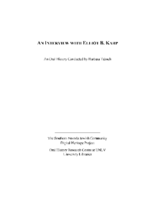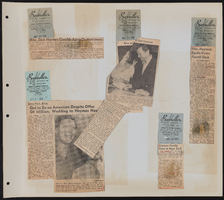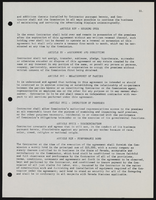Search the Special Collections and Archives Portal
Search Results
Audio clip from interview with Marilyn Glovinsky and Melissa Lemoine, April 2, 2015
Date
Archival Collection
Description
Marilyn Glovinsky talks about growing up Jewish in New York "without thinking about it," and the decision to send her daughter to Hebrew School in Las Vegas.
Sound
Congregation Ner Tamid Records
Identifier
Abstract
The Congregation Ner Tamid Records are comprised of annual reports, congregation bulletins, booklets, and digital and physical photographs documenting the history of Southern Nevada synagogue, Congregation Ner Tamid (CNT) from approximately 1974 to 2018. The collection includes two digital videos of CNT's final service at their Emerson Avenue in Las Vegas, Nevada location before moving to Valle Verde Drive in Henderson, Nevada. The collection contains a digital copy of a CNT scrapbook from 1974 to 1978 and recordings of original music used for CNT's services in 2016. The collection includes annual reports that highlight the synagogue's annual finances and major activities throughout the year and CNT's community newsletters.
Archival Collection

Transcript of interview with Elliot B. Karp by Barbara Tabach, December 17, 2014
Date
Archival Collection
Description
Interview with Elliot B. Karp by Barbara Tabach on December 17, 2014. In this interview, Elliot Karp discusses growing up in a culturally Jewish household in New York and becoming more observant in his teenage and college years. He decided, after a trip to Israel and a year in a rabbinical program, that he wanted to be a "Jewish professional" with a focus on social work and community organizing, and attended a Master's program at Brandeis University. Karp goes on to talk about his work for the Jewish Federation in Ohio and Pennsylvania, and being recruited to come to Las Vegas. He talks about the challenges in the Las Vegas Jewish community and the Jewish Federation's role as an umbrella organization to partner with other agencies to grow and sustain a robust Jewish community in Southern Nevada.
On October 6, 1955, Elliot Karp was born in Mineola, New York to parents of East European heritage who identified as culturally Jewish. As a teenager, Elliot felt the calling to become kosher, balancing this practice with household norms that were not as strict. He eventually became shomer Shabbat just after enrolling at State University of New York at Stony Brook, where he majored in Political Science. After graduating from SUNY, Elliot spent a year living in Israel considering a path in rabbinical studies. By the end of his time, he decided on a different, yet related path, and registered as a graduate student in Brandeis University's School of Jewish Communal Service, on fellowship from Council of Jewish Federations. After graduating, Elliot moved to Columbus, Ohio to work for the Jewish Federation, focusing on fundraising, but was exposed to many different operational areas of the organization. After three years, Elliot was recruited to the Philadelphia office as its director of leadership development. He then left the Federation to work in development at Brandeis University, but after two years, returned to the Federation as the Cincinnati office's chief development officer. In 2008, Elliot received a call to take his highly cultivated leadership and fundraising skills to another Federation office: Las Vegas. After much consideration, he took the job - and challenge - as the office's new chief executive officer. Since then, Elliot has done much to promote communication, coordination and collaboration within the local Jewish community and beyond, through relationship building and successful fundraising efforts. His ultimate desire is to expand funding for programs that get more people involved in Jewish life - while also empowering community members define what a Jewish life means for them.
Text

Transcript of interview with Ron Lawrence by Dennis McBride, June, July and August 1997
Date
Archival Collection
Description
Ron Lawrence is one of the busiest people in the gay community, so I want him to know how much I appreciate his reserving time for me so that I could complete this oral history interview. The importance of his work toward the well-being of the gay community in Las Vegas cannot be measured, and much of what he's accomplished and otherwise made possible will live long after he leaves us. With Ron's consent to this interview, our knowledge of Nevada's gay history is greatly enriched and our record preserved.
Text
Audio recording clip of interview with Rosemary Lynch by Suzanne Becker, June 8, 2004
Date
Archival Collection
Description
Sound

Transcript of interview with Marla Letizia by Barbara Tabach, August 26, 2015
Date
Archival Collection
Description
In this interview, Letizia discusses her career, and breaking gender barriers in both broadcasting as well as in advertising. She also talks about how her family ended up settling in Las Vegas, and the evolution of her relationship with Judaism from childhood to adulthood, eventually leading to her leadership roles with Congregation Ner Tamid as well as Jewish Federation, where she is on the Board of Directors.
Marla R. Letizia is the founder of Big Traffic Mobile Billboards in Las Vegas, Nevada. The company operates mobile billboard advertising trucks and employs brand ambassadors to carry WOBI? walking billboards for retail, gaming, and entertainment clients such as Caesars entertainment, Tropicana, and Cirque Du Soleil. Letizia founded Big Traffic in 2001 after leaving a successful broadcast journalism career to raise her two children. She met her husband, Tom Letizia, while working at KLAS-TV Channel 8 as an assistant production manager. She later became the first female director of live television news broadcasts in Las Vegas at Channel 8. She also developed a TV show called "Las Vegas Turnaround" and a syndicated production called "The Parenting Network." Letizia grew up in Las Vegas, and is a former president of Congregation Ner Tamid and a founding member of the board of trustees of the Meadows School in Las Vegas. In this interview, Letizia discusses her career, and breaking gender barriers in both broadcasting as well as in advertising. She also talks about how her family ended up settling in Las Vegas, and the evolution of her relationship with Judaism from childhood to adulthood, eventually leading to her leadership roles with Congregation Ner Tamid as well as Jewish Federation, where she is on the Board of Directors.
Text
Edward Baca oral history interview
Identifier
Abstract
Oral history interview with Edward Baca conducted by Claytee D. White on January 28, 2016 for the Boyer Early Las Vegas Oral History Project. Baca opens his interview describing his parents and his youth in Wyoming. He then discusses moving to Bryce, Utah in the 1940s, his career in coal mining, and the process of removing coal from the mine. Baca describes his brief time working for the federal government, going to trade school to learn morse code, and working for the railroad. He then talks about switching careers to to work as an air conditioning insulator, and moving to Las Vegas, Nevada in 1969. Baca then describes how he found religion, his efforts to learn more about Christianity, and forming a ministry where he preaches. He discusses his Christian radio program, his singing ministry, and his efforts to save a Christian radio station from closing. Lastly, Baca discusses his religious music albums, touring in a religious music group, and faith healing.
Archival Collection



